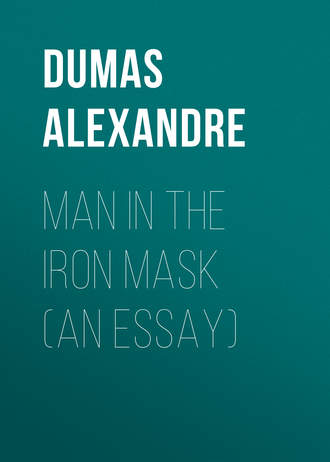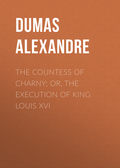
Александр Дюма
Man in the Iron Mask (an Essay)
After this declaration Voltaire made no further reference to the Iron Mask. This last version of the story upset that of Sainte-Foix. Voltaire having been initiated into the state secret by the Marquis de Richelieu, we may be permitted to suspect that being naturally indiscreet he published the truth from behind the shelter of a pseudonym, or at least gave a version which approached the truth, but later on realising the dangerous significance of his words, he preserved for the future complete silence.
We now approach the question whether the prince who thus became the Iron Mask was an illegitimate brother or a twin-brother of Louis XIV. The first was maintained by M. Quentin-Crawfurd; the second by Abbe Soulavie in his ‘Memoires du Marechal Duc de Richelieu’ (London, 1790). In 1783 the Marquis de Luchet, in the ‘Journal des Gens du Monde’ (vol. iv. No. 23, p. 282, et seq.), awarded to Buckingham the honour of the paternity in dispute. In support of this, he quoted the testimony of a lady of the house of Saint-Quentin who had been a mistress of the minister Barbezieux, and who died at Chartres about the middle of the eighteenth century. She had declared publicly that Louis XIV had consigned his elder brother to perpetual imprisonment, and that the mask was necessitated by the close resemblance of the two brothers to each other.
The Duke of Buckingham, who came to France in 1625, in order to escort Henrietta Maria, sister of Louis XIII, to England, where she was to marry the Prince of Wales, made no secret of his ardent love for the queen, and it is almost certain that she was not insensible to his passion. An anonymous pamphlet, ‘La Conference du Cardinal Mazarin avec le Gazetier’ (Brussels, 1649), says that she was infatuated about him, and allowed him to visit her in her room. She even permitted him to take off and keep one of her gloves, and his vanity leading him to show his spoil, the king heard of it, and was vastly offended. An anecdote, the truth of which no one has ever denied, relates that one day Buckingham spoke to the queen with such passion in the presence of her lady-in-waiting, the Marquise de Senecey, that the latter exclaimed, “Be silent, sir, you cannot speak thus to the Queen of France!” According to this version, the Man in the Iron Mask must have been born at latest in 1637, but the mention of any such date would destroy the possibility of Buckingham’s paternity; for he was assassinated at Portsmouth on September 2nd, 1628.
After the taking of the Bastille the masked prisoner became the fashionable topic of discussion, and one heard of nothing else. On the 13th of August 1789 it was announced in an article in a journal called ‘Loisirs d’un Patriote francais’, which was afterwards published anonymously as a pamphlet, that the publisher had seen, among other documents found in the Bastille, a card bearing the unintelligible number “64389000,” and the following note: “Fouquet, arriving from Les Iles Sainte-Marguerite in an iron mask.” To this there was, it was said, a double signature, viz. “XXX,” superimposed on the name “Kersadion.” The journalist was of opinion that Fouquet had succeeded in making his escape, but had been retaken and condemned to pass for dead, and to wear a mask henceforward, as a punishment for his attempted evasion. This tale made some impression, for it was remembered that in the Supplement to the ‘Siecle de Louis XIV’ it was stated that Chamillart had said that “the Iron Mask was a man who knew all the secrets of M. Fouquet.” But the existence of this card was never proved, and we cannot accept the story on the unsupported word of an anonymous writer.
From the time that restrictions on the press were removed, hardly a day passed without the appearance of some new pamphlet on the Iron Mask. Louis Dutens, in ‘Correspondence interceptee’ (12mo, 1789), revived the theory of Baron Heiss, supporting it by new and curious facts. He proved that Louis XIV had really ordered one of the Duke of Mantua’s ministers to be carried off and imprisoned in Pignerol. Dutens gave the name of the victim as Girolamo Magni. He also quoted from a memorandum which by the wish of the Marquis de Castellane was drawn up by a certain Souchon, probably the man whom Papon questioned in 1778. This Souchon was the son of a man who had belonged to the Free Company maintained in the islands in the time of Saint-Mars, and was seventy-nine years old. This memorandum gives a detailed account of the abduction of a minister in 1679, who is styled a “minister of the Empire,” and his arrival as a masked prisoner at the islands, and states that he died there in captivity nine years after he was carried off.
Dutens thus divests the episode of the element of the marvellous with which Voltaire had surrounded it. He called to his aid the testimony of the Duc de Choiseul, who, having in vain attempted to worm the secret of the Iron Mask out of Louis XV, begged Madame de Pompadour to try her hand, and was told by her that the prisoner was the minister of an Italian prince. At the same time that Dutens wrote, “There is no fact in history better established than the fact that the Man in the Iron Mask was a minister of the Duke of Mantua who was carried off from Turin,” M. Quentin-Crawfurd was maintaining that the prisoner was a son of Anne of Austria; while a few years earlier Bouche, a lawyer, in his ‘Essai sur l’Histoire de Provence’ (2 vols. 4to, 1785), had regarded this story as a fable invented by Voltaire, and had convinced himself that the prisoner was a woman. As we see, discussion threw no light on the subject, and instead of being dissipated, the confusion became ever “worse confounded.”
In 1790 the ‘Memoires du Marechal de Richelieu’ appeared. He had left his note-books, his library, and his correspondence to Soulavie. The ‘Memoires’ are undoubtedly authentic, and have, if not certainty, at least a strong moral presumption in their favour, and gained the belief of men holding diverse opinions. But before placing under the eyes of our readers extracts from them relating to the Iron Mask, let us refresh our memory by recalling two theories which had not stood the test of thorough investigation.
According to some MS. notes left by M. de Bonac, French ambassador at Constantinople in 1724, the Armenian Patriarch Arwedicks, a mortal enemy of our Church and the instigator of the terrible persecutions to which the Roman Catholics were subjected, was carried off into exile at the request of the Jesuits by a French vessel, and confined in a prison whence there was no escape. This prison was the fortress of Sainte-Marguerite, and from there he was taken to the Bastille, where he died. The Turkish Government continually clamoured for his release till 1723, but the French Government persistently denied having taken any part in the abduction.
Even if it were not a matter of history that Arwedicks went over to the Roman Catholic Church and died a free man in Paris, as may be seen by an inspection of the certificate of his death preserved among the archives in the Foreign Office, one sentence from the note-book of M. de Bonac would be sufficient to annihilate this theory. M. de Bonac says that the Patriarch was carried off, while M. de Feriol, who succeeded M. de Chateauneuf in 1699, was ambassador at Constantinople. Now it was in 1698 that Saint-Mars arrived at the Bastille with his masked prisoner.
Several English scholars have sided with Gibbon in thinking that the Man in the Iron Mask might possibly have been Henry, the second son of Oliver Cromwell, who was held as a hostage by Louis XIV.
By an odd coincidence the second son of the Lord Protector does entirely disappear from the page of history in 1659; we know nothing of where he afterwards lived nor when he died. But why should he be a prisoner of state in France, while his elder brother Richard was permitted to live there quite openly? In the absence of all proof, we cannot attach the least importance to this explanation of the mystery.
We now come to the promised extracts from the ‘Memoires du Marechal de Richelieu’:
“Under the late king there was a time when every class of society was asking who the famous personage really was who went by the name of the Iron Mask, but I noticed that this curiosity abated somewhat after his arrival at the Bastille with Saint-Mars, when it began to be reported that orders had been given to kill him should he let his name be known. Saint-Mars also let it be understood that whoever found out the secret would share the same fate. This threat to murder both the prisoner and those who showed too much curiosity about him made such an impression, that during the lifetime of the late king people only spoke of the mystery below their breath. The anonymous author of ‘Les Memoires de Perse’, which were published in Holland fifteen years after the death of Louis XIV, was the first who dared to speak publicly of the prisoner and relate some anecdotes about him.
“Since the publication of that work, liberty of speech and the freedom of the press have made great strides, and the shade of Louis XIV having lost its terrors, the case of the Iron Mask is freely discussed, and yet even now, at the end of my life and seventy years after the death of the king, people are still asking who the Man in the Iron Mask really was.
“This question was one I put to the adorable princess, beloved of the regent, who inspired in return only aversion and respect, all her love being given to me. As everyone was persuaded that the regent knew the name, the course of life, and the cause of the imprisonment of the masked prisoner, I, being more venturesome in my curiosity than others, tried through my princess to fathom the secret. She had hitherto constantly repulsed the advances of the Duc d’ Orleans, but as the ardour of his passion was thereby in no wise abated, the least glimpse of hope would be sufficient to induce him to grant her everything she asked; I persuaded her, therefore, to let him understand that if he would allow her to read the ‘Memoires du Masque’ which were in his possession his dearest desires would be fulfilled.
“The Duc d’Orleans had never been known to reveal any secret of state, being unspeakably circumspect, and having been trained to keep every confidence inviolable by his preceptor Dubois, so I felt quite certain that even the princess would fail in her efforts to get a sight of the memoranda in his possession relative to the birth and rank of the masked prisoner; but what cannot love, and such an ardent love, induce a man to do?
“To reward her goodness the regent gave the documents into her hands, and she forwarded them to me next day, enclosed in a note written in cipher, which, according to the laws of historical writing, I reproduce in its entirety, vouching for its authenticity; for the princess always employed a cipher when she used the language of gallantry, and this note told me what treaty she had had to sign in order that she might obtain the documents, and the duke the desire of his heart. The details are not admissible in serious history, but, borrowing the modest language of the patriarchal time, I may say that if Jacob, before he obtained possession of the best beloved of Laban’s daughters, was obliged to pay the price twice over, the regent drove a better bargain than the patriarch. The note and the memorandum were as follows: “‘2. 1. 17. 12. 9. 2. 20. 2. 1. 7. 14 20. 10. 3. 21. 1. 11. 14. 1. 15. 16. 12. 17. 14. 2. 1. 21. 11. 20. 17. 12. 9. 14. 9. 2. 8. 20. 5. 20. 2. 2. 17. 8. 1. 2. 20. 9. 21. 21. 1. 5. 12. 17. 15. 00. 14. 1. 15. 14. 12. 9. 21. 5. 12. 9. 21. 16. 20. 14. 8. 3.
“‘NARRATIVE OF THE BIRTH AND EDUCATION OF THE UNFORTUNATE PRINCE WHO WAS SEPARATED FROM THE WORLD BY CARDINALS RICHELIEU AND MAZARIN AND IMPRISONED BY ORDER OF LOUIS XIV.
“‘Drawn up by the Governor of this Prince on his deathbed.
“‘The unfortunate prince whom I brought up and had in charge till almost the end of my life was born on the 5th September 1638 at 8.30 o’clock in the evening, while the king was at supper. His brother, who is now on the throne, was born at noon while the king was at dinner, but whereas his birth was splendid and public, that of his brother was sad and secret; for the king being informed by the midwife that the queen was about to give birth to a second child, ordered the chancellor, the midwife, the chief almoner, the queen’s confessor, and myself to stay in her room to be witnesses of whatever happened, and of his course of action should a second child be born.
“‘For a long time already it had been foretold to the king that his wife would give birth to two sons, and some days before, certain shepherds had arrived in Paris, saying they were divinely inspired, so that it was said in Paris that if two dauphins were born it would be the greatest misfortune which could happen to the State. The Archbishop of Paris summoned these soothsayers before him, and ordered them to be imprisoned in Saint-Lazare, because the populace was becoming excited about them – a circumstance which filled the king with care, as he foresaw much trouble to his kingdom. What had been predicted by the soothsayers happened, whether they had really been warned by the constellations, or whether Providence by whom His Majesty had been warned of the calamities which might happen to France interposed. The king had sent a messenger to the cardinal to tell him of this prophecy, and the cardinal had replied that the matter, must be considered, that the birth of two dauphins was not impossible, and should such a case arrive, the second must be carefully hidden away, lest in the future desiring to be king he should fight against his brother in support of a new branch of the royal house, and come at last to reign.
“‘The king in his suspense felt very uncomfortable, and as the queen began to utter cries we feared a second confinement. We sent to inform the king, who was almost overcome by the thought that he was about to become the father of two dauphins. He said to the Bishop of Meaux, whom he had sent for to minister to the queen, “Do not quit my wife till she is safe; I am in mortal terror.” Immediately after he summoned us all, the Bishop of Meaux, the chancellor M. Honorat, Dame Peronete the midwife, and myself, and said to us in presence of the queen, so that she could hear, that we would answer to him with our heads if we made known the birth of a second dauphin; that it was his will that the fact should remain a state secret, to prevent the misfortunes which would else happen, the Salic Law not having declared to whom the inheritance of the kingdom should come in case two eldest sons were born to any of the kings.
“‘What had been foretold happened: the queen, while the king was at supper, gave birth to a second dauphin, more dainty and more beautiful than the first, but who wept and wailed unceasingly, as if he regretted to take up that life in which he was afterwards to endure such suffering. The chancellor drew up the report of this wonderful birth, without parallel in our history; but His Majesty not being pleased with its form, burned it in our presence, and the chancellor had to write and rewrite till His Majesty was satisfied. The almoner remonstrated, saying it would be impossible to hide the birth of a prince, but the king returned that he had reasons of state for all he did.
“‘Afterwards the king made us register our oath, the chancellor signing it first, then the queen’s confessor, and I last. The oath was also signed by the surgeon and midwife who attended on the queen, and the king attached this document to the report, taking both away with him, and I never heard any more of either. I remember that His Majesty consulted with the chancellor as to the form of the oath, and that he spoke for a long time in an undertone to the cardinal: after which the last-born child was given into the charge of the midwife, and as they were always afraid she would babble about his birth, she has told me that they often threatened her with death should she ever mention it: we were also forbidden to speak, even to each other, of the child whose birth we had witnessed.
“‘Not one of us has as yet violated his oath; for His Majesty dreaded nothing so much as a civil war brought about by the two children born together, and the cardinal, who afterwards got the care of the second child into his hands, kept that fear alive. The king also commanded us to examine the unfortunate prince minutely; he had a wart above the left elbow, a mole on the right side of his neck, and a tiny wart on his right thigh; for His Majesty was determined, and rightly so, that in case of the decease of the first-born, the royal infant whom he was entrusting to our care should take his place; wherefore he required our signmanual to the report of the birth, to which a small royal seal was attached in our presence, and we all signed it after His Majesty, according as he commanded. As to the shepherds who had foretold the double birth, never did I hear another word of them, but neither did I inquire. The cardinal who took the mysterious infant in charge probably got them out of the country.
“‘All through the infancy of the second prince Dame Peronete treated him as if he were her own child, giving out that his father was a great nobleman; for everyone saw by the care she lavished on him and the expense she went to, that although unacknowledged he was the cherished son of rich parents, and well cared for.
“‘When the prince began to grow up, Cardinal Mazarin, who succeeded Cardinal Richelieu in the charge of the prince’s education, gave him into my hands to bring up in a manner worthy of a king’s son, but in secret. Dame Peronete continued in his service till her death, and was very much attached to him, and he still more to her. The prince was instructed in my house in Burgundy, with all the care due to the son and brother of a king.
“‘I had several conversations with the queen mother during the troubles in France, and Her Majesty always seemed to fear that if the existence of the prince should be discovered during the lifetime of his brother, the young king, malcontents would make it a pretext for rebellion, because many medical men hold that the last-born of twins is in reality the elder, and if so, he was king by right, while many others have a different opinion.
“‘In spite of this dread, the queen could never bring herself to destroy the written evidence of his birth, because in case of the death of the young king she intended to have his twin-brother proclaimed. She told me often that the written proofs were in her strong box.







